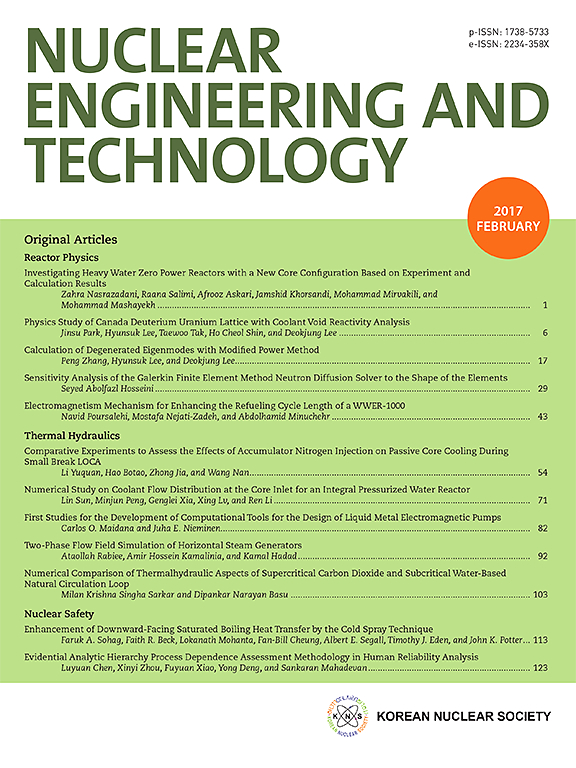An innovative and efficient implementation of matrix-free Newton krylov method for neutronics/thermal-hydraulics coupling simulation
IF 2.6
3区 工程技术
Q1 NUCLEAR SCIENCE & TECHNOLOGY
引用次数: 0
Abstract
The core physical behavior of reactors is essentially the result of multi-physical fields coupling feedback. High-fidelity neutronics/thermal-hydraulics (N/TH) analysis can simulate and predict nuclear reactor core phenomena realistically, providing advanced and reliable technical means during the design and safety analysis of nuclear reactor. In this work, an efficient and robustness coupling method using power density as the coupling parameter, Matrix-Free Newton Krylov (MFNK) method, is successfully developed and innovatively implemented in HNET for high-fidelity N/TH coupling simulation. To enhance the efficiency and stability, the multi-level generalized equivalence theory-based CMFD (ML-gCMFD) iterative acceleration method and ML-gCMFD coupling acceleration method are proposed. In addition, the nonlinear preconditioning and hybrid perturbation size formula are implemented to further improve the convergence. Finally, to evaluate the numerical accuracy, convergence, efficiency and stability of MFNK method, a series of representative problems, including a three-dimensional (3D) single fuel pin problem, VERA Benchmark Problem 6, and VERA Benchmark Problem 7, are analyzed by comparing with the current N/TH coupling methods. Numerical results indicate that MFNK method can obtain strong stability, high convergence performance, and relatively high computational efficiency while ensuring high accuracy. It demonstrates that MFNK method has significant performance advantages and potential for high-fidelity N/TH coupling simulation.
用于中子/热-水耦合模拟的无矩阵牛顿克雷洛夫方法的创新和高效实施
反应堆堆芯物理行为本质上是多物理场耦合反馈的结果。高保真中子/热工水力(N/TH)分析可以真实地模拟和预测核反应堆堆芯现象,为核反应堆设计和安全分析提供先进可靠的技术手段。本研究成功开发了一种以功率密度为耦合参数的高效稳健耦合方法--无矩阵牛顿克雷洛夫(MFNK)方法,并在 HNET 中创新性地实现了高保真 N/TH 耦合模拟。为了提高效率和稳定性,提出了基于广义等效理论的多层次 CMFD(ML-gCMFD)迭代加速方法和 ML-gCMFD 耦合加速方法。此外,还采用了非线性预处理和混合扰动大小公式来进一步提高收敛性。最后,为了评价 MFNK 方法的数值精度、收敛性、效率和稳定性,分析了一系列具有代表性的问题,包括三维(3D)单燃料针问题、VERA 基准问题 6 和 VERA 基准问题 7,并与当前的 N/TH 耦合方法进行了比较。数值结果表明,MFNK 方法在保证高精度的同时,还能获得较强的稳定性、较高的收敛性能和较高的计算效率。这表明 MFNK 方法在高保真 N/TH 耦合仿真方面具有显著的性能优势和潜力。
本文章由计算机程序翻译,如有差异,请以英文原文为准。
求助全文
约1分钟内获得全文
求助全文
来源期刊

Nuclear Engineering and Technology
工程技术-核科学技术
CiteScore
4.80
自引率
7.40%
发文量
431
审稿时长
3.5 months
期刊介绍:
Nuclear Engineering and Technology (NET), an international journal of the Korean Nuclear Society (KNS), publishes peer-reviewed papers on original research, ideas and developments in all areas of the field of nuclear science and technology. NET bimonthly publishes original articles, reviews, and technical notes. The journal is listed in the Science Citation Index Expanded (SCIE) of Thomson Reuters.
NET covers all fields for peaceful utilization of nuclear energy and radiation as follows:
1) Reactor Physics
2) Thermal Hydraulics
3) Nuclear Safety
4) Nuclear I&C
5) Nuclear Physics, Fusion, and Laser Technology
6) Nuclear Fuel Cycle and Radioactive Waste Management
7) Nuclear Fuel and Reactor Materials
8) Radiation Application
9) Radiation Protection
10) Nuclear Structural Analysis and Plant Management & Maintenance
11) Nuclear Policy, Economics, and Human Resource Development
 求助内容:
求助内容: 应助结果提醒方式:
应助结果提醒方式:


